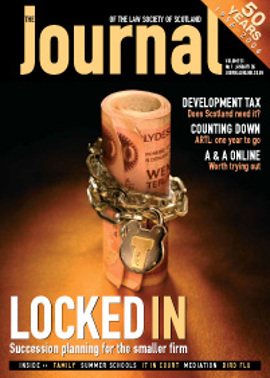Regulation, 2006 style

The President’s November letter came as something of a bolt from the blue, even for those in close touch with the ongoing regulation debate. The LDU had taken a position of considered neutrality, and fully understands the numerous pressures and influences at work.
There is little new about a troubled relationship between the profession and the so-called “public”. That persists in spite of independent reports showing that we get on just fine with our clients, 99% of the time. Clients continue to bombard us with instructions and pleas for help, as we speak.
I recall a sympathetic observation years ago that the Society must often identify with the unenviable position of the referee in an Old Firm match. Whatever the level of performance, the air will fill with the inevitable barracking from both ends.
It is possible to speculate, however, that the Council’s decision may prove the most important ever made, in terms of restoring the profession to unity and health. We have moved far from the purposes of the Society as visualised in the high days of the welfare state after the Second World War. Legal aid went in 1986 under an equivalent head of public steam. A thriving PQLE role had by the 90s to concede ground to the marketplace with the advent of compulsory training. During all this, the Society was increasingly being left with complaints, and it was inevitable that relationships with its own members would progressively be damaged. So-called “Client Relations” committees increased from three to 12 or more. Let’s face it – they were still complaints committees. All at Drumsheugh strove to give the public, and those purporting to speak for them, much of what they demanded; but despite introducing significant lay membership, and trying to work with legislation that virtually eliminated any recognition of solicitors’ rights, the Society still received little else than continued abuse and general vilification.
Faced with this unholy and sustained alliance of the Third and Fourth Estates, the Council really had no option.
The Society may be smaller in future, but will surely be more unified, and more likely to be seen as supporting and helping, rather than threatening, its members. If access to justice has any place in Millennium Scotland, the vast majority of good and committed professionals should be encouraged and rewarded, not abused any more than is the inevitable lot of lawyers. That includes appropriate protection from false accusation and unjustified attack, not increased exposure to the motivated and the malicious.
The Executive is, however, left in an interesting position. The danger of acting by populism rather than principle is that it may find itself acceding to a seemingly overwhelming public demand for regulation without any involvement of lawyers whatsoever. Those who see themselves as wounded by the law, or by some aspect of the legal system, are never going to accept any decision by lawyers that does not give them what they want. The new regulators entering this cauldron of anger and hate, easily evidenced on any of the anti-lawyer websites, will be given no more thanks, whatever the quality of their work, than the Society has historically received.
Much of the difficulty about the non-existent rights of solicitors in the complaints process derives from the 1989-90 legislation, an abysmal creation, again under a head of public steam. As highlighted in the LDU consultation response, the legislators seem to have proceeded on the idea that you can do anything you like to solicitors without having to give them significant rights. That abuse, suffered in the vague belief that this was somehow necessary to preserve self-regulation, was always going to end in a post-ECHR world. There has been increasing tension between LDU advisers and the Society. As experienced solicitors we are committed to the highest standards of conduct and service, and know the regulators’ difficulties. We could not, however, in conscience continue to allow what was essentially a denial of the most vestigial rights for individual solicitors and firms within the existing complaints system.
Hopefully, the new legislation will arrive quickly, and contain assurances for the honest complainer of a reasonably prompt and fair hearing, alongside all appropriate rights and protections for solicitors. It may not however be so simple.
One possible scenario being looked at, where the Society keeps conduct but not service, will not work. The 1990 definition of “conduct” includes both service and professional misconduct. A new entity which meets the public demand will have no lawyers whatsoever. What if the first case in the door is a service complaint, by a disgruntled criminal client, saying that his lawyer did not call all the cited witnesses, or ask the right questions of those called? A lay person, however well trained, could not begin to deal with such a complaint, without expert legal opinion.
The next couple of years will not be straightforward, but the Society should stick to its guns and, whatever the changes in the Executive’s tack, we should not take back the poisoned chalice of complaints against the profession under anything resembling the existing regime.
In this issue
- Pressing ahead
- Regulation, 2006 style
- Held to ransom?
- A world turned upside down
- Quiet revolutions
- For supplement read tax
- Why mediation is a bad idea, and other myths
- Advice in a Europe of many notions
- At the touch of a button
- What sort of courts do we want? (And when?)
- KM in practice
- If the bug bites
- Refreshing risk quiz
- The partnership must go on
- First duty to the court
- A difficult birth
- Nuclear power no thanks?
- Due diligence
- Will less mean better?
- Scottish Solicitors' Discipline Tribunal
- Website reviews
- Book reviews
- Back to the future
- Users' IT requirements for ARTL






